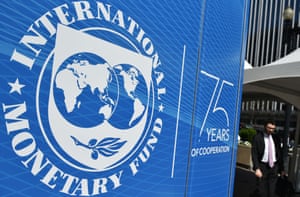
The IMF has downgraded forecasts for economic growth across the world in its latest world economic outlook released this week. The report should provide sobering reading for both major parties ahead of the federal election as a substantial slowdown in the world economy could severely affect revenue forecasts and the ability to deliver spending commitments and tax cuts while also balancing the budget.
Should you be after a quick taste for how the world economy has been tracking over the past 18 months, you could do worse than just peruse the titles of the past six IMF world economic outlook reports.
At the start of last year things were looking almost upbeat. The title of the IMF’s January update, Brighter Prospects, Optimistic Markets, Challenges Ahead, is economic speak for “cripes, aren’t we all a bit unusually happy!”. By April 2018 the title had become “Cyclical Upswing, Structural Change”, which again spoke of economic sunshine, even if it did warn of the need to adjust to the post-GFC world.
But such giddiness was not to last.
By the middle of last year the July update was warning “Less Even Expansion, Rising Trade Tensions”, and the October outlook was a decidedly measured if still somewhat neutral, “Challenges to Steady Growth”.
But with this new year, all neutrality has disappeared. The January update stated it plain: “A Weakening Global Expansion”. And just in case you had not caught their drift, the latest outlook, released this week, was headed, “Growth Slowdown, Precarious Recovery”
From brighter prospect to precarious recovery in less than two years. Hope you enjoyed that moment of economic joy while it lasted.
The decline is across roughly 70% of the world’s economies, with the IMF blaming the “escalation of US–China trade tensions”, troubles in the “auto sector in Germany” plus “tighter credit policies in China, and financial tightening alongside the normalization of monetary policy in the larger advanced economies.”
In effect the structural changes and rising trade tensions warned in previous outlooks all came to pass. As a result the forecast for world GDP this year has been cut from 3.9% this time last year to just 3.3%:
For individual countries, the news is mostly bad, and Australia is not immune. The IMF has cut the projection for Australia’s GDP growth this year from the 3.1% it made a year ago to just 2.1%:
The US and UK have also all seen their growth forecasts cut severely, with the UK now having had its forecast for GDP growth in 2019 cut every update since the Brexit vote in 2016.
Should the 2.1% growth forecast for Australia come to fruition it would mark the second worst calendar year result since the 1990s recession:
It also is out of step with the forecasts in April’s budget, which estimated GDP growth for 2018-19 of 2.25% followed by 2.75% growth for 2019-20. The IMF is also massively more pessimistic than the Reserve Bank, which predicted 3% growth for 2019 in its most recent statement on monetary policy.
The one bit of good news is the IMF expects the world economy to rebound somewhat in 2020, and sees Australia’s economy growing by 2.75% for the next five years – again, however, this is less optimistic than the budget’s projection of 3% growth from 2021 onwards.
But such optimism must be tempered by the realisation that for the foreseeable future the IMF predicts economic growth that at best is on a par with what we have experienced over the previous six years. Indeed, among Australia, Canada, the UK and US all are predicted to experience growth around half of what occurred before the GFC:
Should that occur, it would be more than 15 years without consistent growth in Australia of over 3%. For a generation of workers, the realisation is coming that maybe this is as good as it gets.
Somewhat oddly the IMF continues to predict unemployment will fall – indeed it remains more optimistic on this front than the budget:
But even should the unemployment rate fall to the 4.8% level predicted by the IMF, in a time of weak economic growth it would be surprising to see wages growing much stronger than they are now.
All in all it is not the greatest of pictures, and certainly more downbeat than the budget which suggested “the economy is expected to continue to benefit from solid global growth, especially amongst Australia’s major trading partners”.
Whoever wins the election might find that the budget is out of date not just because it was a blatantly political document designed to win an election in the short-term which cared little for what occurred after that.
Should the world’s economy continue to slow and not improve next year by as much as the IMF would hope (a hope which recently has been found to be misguided), the choice of delivering a surplus next year or stimulating growth through greater spending will very much come to the fore.
It would be a major economic and political test for whoever wins.
[“source=theguardian”]
